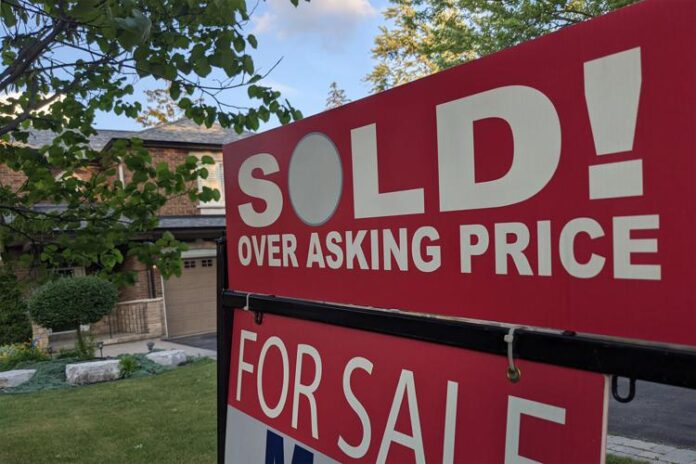The latest in a series of new Biden administration rule changes that charge higher fees to certain home buyers with good credit and lower fees for buyers with worse credit went into effect this week despite pushback from Republicans and many financial experts.
A group of U.S. House and Senate Republicans as well as state officials were unable to stop the rule, which a Biden administration official confirmed went into effect as planned Monday.
A coalition of Senate Republicans recently sent a letter to Sandra Thompson, director of the Federal Housing Finance Agency, the latest in several policy changes from the group. The agency implemented the rule change this week.
Critics argue the changes, which increase Loan-Level Price Adjustment fees for mortgage borrowers with higher credit scores and decrease fees for those with worse credit, amount to penalizing those with good credit to help those with bad credit in the name of equity.
“This shortsighted and counterproductive policy demonstrates a profound misunderstanding of the necessity of accurately tailoring housing finance products to credit risk and establishes a perverse incentive that punishes hardworking Americans for their fiscal prudence,” the letter said.
The loan-level price adjustment is a fee assessed after bankers evaluate the risk of lending them money, and the change potentially costs the affected borrowers with better credit thousands of dollars.
“The housing market should not be exploited as a means to pander to targeted demographics that you have chosen, nor an instrument to secure political favoritism,” the Senators’ letter said.
Adam Russell, a spokesperson for the FHFA, confirmed to The Center Square that the fee change went into effect as scheduled Monday, but added that “there is a good deal of misinformation” about the policy. The FHFA has publicly pushed back on the characterization that these fee changes punish those with better credit to help those with worse credit.
Supporters of the policy point out this is one of several changes to the fees policy, a policy that is often updated, and argue that it is unfair to draw a connection between the fee changes for the two groups, namely those with good and bad credit. They also emphasize that those with worse credit will still pay significantly more than those with better credit.
The change applies only to certain loans backed by Freddie Mac and Fannie Mae. A chart from the Urban Institute shows that those with credit scores of 680 or higher and with down payments between 5% and 20% will pay higher fees, while borrowers with down payments of less than 5% will pay smaller fees, regardless of credit scores.
Thompson said in a news release that the fee change would “advance their mission of facilitating equitable and sustainable access to homeownership.”
The lawmakers took issues with this assumption, though, saying many poorer Americans have good credit and will be punished by this policy.
“Moreover, your proposal incorrectly assumes that creditworthiness is solely attained by only the affluent, blatantly disregarding the countless lower-income Americans who have demonstrated exceptional financial responsibility,” the letter said. “By conflating credit scores with wealth, you not only engage in a gross oversimplification of a complex issue but also perpetuate a false narrative that unfairly maligns hardworking citizens in the lower-income bracket.”
The lawmakers brought up what has become a key criticism of the plan, in particular, that pushing home loans to Americans with poor credit was a key reason for the 2008 financial crisis.
“The fact that a proposal flaunting credit risk is being openly pushed by FHFA just a decade-and-a-half after the housing-led 2008 financial crisis is staggering,” the letter said.
Economists have raised similar concerns, pointing out that the FHFA cites equity reasons, not financial, as the driver for this decision.
“Rather than saddle those with scores 680 or lower with more debt, it’s far better to encourage them to re-establish credit,” Joel Griffith, an economic expert at the Heritage Foundation, told The Center Square. “Most people find themselves financially strapped at some point. A few years of consistent timely payments and debt paydown can help someone even emerging from bankruptcy attain scores at 680 or worse with a near 0% loan from FHA.”
States have also pushed back. A coalition of state financial officials in 26 states are speaking out against the new federal mortgage fees, which they call “unconscionable.”
“This new policy makes it more expensive for people with good credit to buy houses – and that’s absurd,” said Pennsylvania Treasurer Stacy Garrity, who leads the coalition. “Americans who have built a good credit score and saved enough to make a strong down payment should not be penalized and forced to pay more on their mortgage every single month.”
Griffith also argues the plan would increase the cost of homes, in particular starter homes.
Republicans in the U.S. House have also voiced their disapproval of the rule change. U.S. Rep. Andy Biggs, R-Ariz., introduced the Responsible Borrowers Protection Act last month. The legislation would have blocked the rule from going into effect, but has now missed the deadline. It could be a framework for future legislative efforts to overturn the rule.
“The FHFA – led by a President Joe Biden appointed director – is punishing financially responsible mortgage borrowers,” Biggs said. “Their agenda of equity over equality defies common sense and will endanger the stability of the housing market.”
The Senate letter was signed by U.S. Sen. Mike Braun, R-Ind., Ted Budd, R-N.C., Shelley Moore Capito, R-W.V. Tom Cotton, R-Ark., Kevin Cramer, R-N.D., Lindsey Graham R-S.C., Chuck Grassley, R-Iowa, Ron Johnson, R-Wisc., James Lankford, R-Okla., Jerry Moran, R-Kan., Mike Rounds, R-S.D., Marco Rubio, R-Fla., Eric Schmitt, R-Mo., John Thune, R-S.D., and Todd Young, R-Ind.
Republished with the permission of The Center Square.














